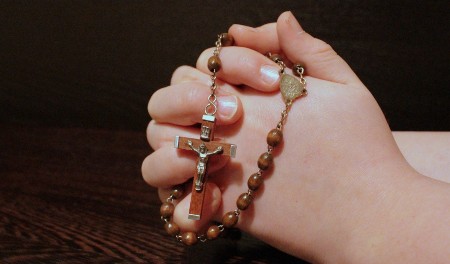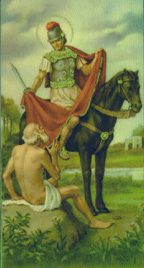Sioux Falls
FREE Catholic Classes
DIOCESE OF SIOUX FALLS (SIOUXORMENSIS).
Suffragan of St. Paul , comprises all that part of the State of South Dakota east of the Missouri River, an area of 34,861 square miles. The western portion of the state, forming the present Diocese of Lead , was detached from the Diocese of Sioux Falls, 8 August, 1902. The early history of religion in South Dakota (until 1879) must be sought for in the histories respectively of St. Paul, Dubuque, and Nebraska. The first Mass celebrated in South Dakota was in 1842, in Brown County, by the late Monsignor Ravoux of St. Paul on his first visit to the Sioux Indians ; and the first church erected was in 1867, by the late Father Pierre Boucher, who was sent by Bishop Grace of St. Paul to Jefferson, Union County, to attend the Catholics scattered about that centre. In August, 1879, the Vicariate Apostolic of Dakota, whose boundaries corresponded with the ten existing civil boundaries of the newly formed Territory of Dakota, was established, and the Right Reverend Martin Marty, Abbot of St. Meinrad's Benedictine Abbey, Indiana, nominated Bishop of Tiberias and vicar Apostolic of the new district. Bishop Marty was consecrated in the Church of St. Ferdinand, Ferdinand, Indiana, 1 February, 1880, by the Right Reverend Francis Silas Chatard, the present Bishop of Indianapolis. The vicariate was an immense district to govern (149,112 square miles) with scarcely any mode of travelling, except by the primitive ox or mule teams. A few miles of railroad existed from Sioux City to Yankton. The new vicar Apostolic went directly to Yankton, where he took up his residence. He found 12 priests administering to a scattered Catholic population of less than 14,000 souls and 20 churches. Many and heroic were the hardships endured by both bishop and priests. At the close of 1881 the number of priests increased to 37, the number of churches to 43 with 35 stations. There were 3 convents, 2 academies for young ladies, 4 parochial schools for the white and 4 schools for the Indian children, while the Catholic population, including 700 Indians, numbered 15,800 souls. The decade beginning with 1880, witnessed a wonderful development and the population increased from 135,180 to 250,000. The statistics at the end of 1883 show 45 priests, 82 churches, 67 stations, 4 convents, 4 academies, 12 parochial schools, 6 Indian schools and a Catholic population, including 1,600 Indians, of 25,600 souls. The Territory of Dakota was divided by Act of Congress, 22 February, 1889, and the two states, North and South Dakota, were admitted to the Union, 2 November, 1889. The same month witnessed the ecclesiastical division of the vicariate, and two new dioceses were formed, Sioux Falls ( South Dakota ) with Bishop Marty its first bishop ; and Jamestown ( North Dakota ), now Fargo, with Bishop Shanley (d. July, 1909) its first incumbent. In 1894 Bishop Marty was transferred to the Diocese of St. Cloud, Minnesota, where he died 19 September, 1896.
The efforts of Bishop Marty were crowned with marvellous success. He devoted himself especially to the Indian race. He spoke their language and translated hymns and prayers into their tongue. The second and present (1911) Bishop of Sioux Falls, the Right Rev. Thomas O'Gorman, was born at Boston, Massachusetts, 1 May, 1843, he moved with his parents to St. Paul, and was one of the first two students selected for the priesthood by Bishop Cretin, the other was Archbishop Ireland. Having pursued his ecclesiastical studies in France, he returned to St. Paul, where he was ordained priest, 5 November, 1865. He was pastor in turn of Rochester and Faribault, Minn., and first president and professor of dogmatic theology at St. Thomas' College, St. Paul. In 1890 he was appointed Professor of Church History in the Catholic University, Washington, D. C., was consecrated in St. Patrick's Church, Washington, D. C. (19 April, 1896) by Cardinal Satolli, then Apostolic delegate to this country, and on 1 May, 1896, was installed in the pro- cathedral of his episcopal see. The statistics of the diocese then showed 51 secular and 14 regular priests, 50 churches with resident priests, 61 missions with churches, 100 stations, 10 chapels, 14 parochial schools, 61 Indian schools, 2 orphanages, and l hospital. There were 3 communities of men and 6 of women, while the Catholic population, white and Indian, was estimated at 30,000 souls. Bishop O'Gorman infused new life into the diocese. The population increased so rapidly that in 1902 the Diocese of Lead was erected. The statistics of the diocese (1911) are in priests, secular 102, regular 13; students 10; churches with resident priests, 91; missions with churches, 70; stations, 23; chapels, 13; parochial schools, 23 with 2,500 children in attendance; hospitals, 4. There are 3 communities of men: Benedictines, Eudists, and the Clerics of St. Viateur. The communities of women are: Dominican Sisters; Presentation Sisters; Benedictine Sisters; Sisters of the Third Order of St. Francis; School Sisters of St. Francis, and the Sisters of Charity of St. Louis. Columbus College at Chamberlain, in charge of the Clerics of St. Viateur is an institution of great promise. The Catholic population, including 500 Indians, is 50,000. In the vicariate Apostolic of thirty-one years ago, where there were only 1 bishop and 12 priests, there are now (1911) 4 bishops and 284 priests.
Join the Movement
When you sign up below, you don't just join an email list - you're joining an entire movement for Free world class Catholic education.
-

-
Mysteries of the Rosary
-
St. Faustina Kowalska
-
Litany of the Blessed Virgin Mary
-
Saint of the Day for Wednesday, Oct 4th, 2023
-
Popular Saints
-
St. Francis of Assisi
-
Bible
-
Female / Women Saints
-
7 Morning Prayers you need to get your day started with God
-
Litany of the Blessed Virgin Mary
The Power of the Rosary: Why Praying the Rosary Matters for Catholics
-

Lasers Reveal Hidden Mayan City of Valeriana with 6,500 Structures in Mexico
-

Embracing Peace and Unity in a Time of Division
-
The 'Black Legend': Historian Argues Anti-Catholic Bias in Spanish Conquest Narratives
-
This Catholic Hero Who Fought Against Communism Should Be Released Immediately
Daily Catholic
 Daily Readings for Monday, November 11, 2024
Daily Readings for Monday, November 11, 2024 St. Martin of Tours: Saint of the Day for Monday, November 11, 2024
St. Martin of Tours: Saint of the Day for Monday, November 11, 2024 Prayer for Deceased Veterans: Prayer of the Day for Monday, November 11, 2024
Prayer for Deceased Veterans: Prayer of the Day for Monday, November 11, 2024- Daily Readings for Sunday, November 10, 2024
- St. Leo the Great: Saint of the Day for Sunday, November 10, 2024
- Evening Prayers: Prayer of the Day for Saturday, November 09, 2024
![]()
Copyright 2024 Catholic Online. All materials contained on this site, whether written, audible or visual are the exclusive property of Catholic Online and are protected under U.S. and International copyright laws, © Copyright 2024 Catholic Online. Any unauthorized use, without prior written consent of Catholic Online is strictly forbidden and prohibited.
Catholic Online is a Project of Your Catholic Voice Foundation, a Not-for-Profit Corporation. Your Catholic Voice Foundation has been granted a recognition of tax exemption under Section 501(c)(3) of the Internal Revenue Code. Federal Tax Identification Number: 81-0596847. Your gift is tax-deductible as allowed by law.






 Daily Readings for Monday, November 11, 2024
Daily Readings for Monday, November 11, 2024 St. Martin of Tours: Saint of the Day for Monday, November 11, 2024
St. Martin of Tours: Saint of the Day for Monday, November 11, 2024 Prayer for Deceased Veterans: Prayer of the Day for Monday, November 11, 2024
Prayer for Deceased Veterans: Prayer of the Day for Monday, November 11, 2024

